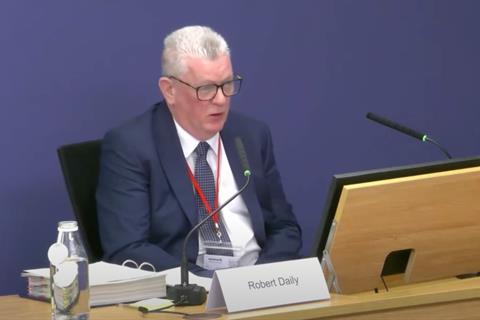Lawyers for the Post Office feared a public relations disaster if Scottish prosecutors pulled the plug on prosecutions, the public inquiry has heard.
In a witness statement published yesterday, Kenneth Donnelly, deputy crown agent for specialist casework at the Crown Office and Procurator Fiscal Service (COPFS) in Scotland, said the organisation was approached in 2013 after provisionally deciding that all prosecutions in Scotland should be stopped.
Donelly said COPFS officials met with BTO Solicitors and Cartwright King, the Post Office’s external solicitors in Scotland and England & Wales respectively. He recalled that the position adopted by COPFS ‘had been assessed by CK to raise a considerable public relations storm for POL [Post Office Limited] if it were followed’.
This was a particularly critical period in the Post Office scandal, coming towards the end of hundreds of prosecutions of sub-postmasters when forensic accountant Second Sight was investigating whether bugs in the Horizon system had caused shortages in accounts.
Donnelly’s evidence suggests that lawyers were still concerned about the reputation of the Post Office at a time when questions were being asked about the validity of Horizon and the prosecutions based on its data.
Donnelly explained that Post Office Limited advised Scottish prosecution officials in 2013 that a full examination of the Horizon system would be undertaken and would be completed within eight months.
But Donnelly said it was understood that the Post Office did not commission a second report as discussed, and subsequently advised COPFS that despite consulting with academics, a further interrogation of the Horizon Online system was not possible.
Speaking in the Scottish parliament last week, Lord Advocate Dorothy Bain KC said the Crown Office and Procurator Fiscal Service were ‘repeatedly misled’ by the Post Office about the reliability of Horizon and that ‘assurances which were just not true were repeatedly given’.
Some 73 individuals are believed to have been convicted in Scotland on the basis of evidence from Horizon: 16 have come forward to challenge their convictions and four have had their convictions overturned.
Bain stated that in May 2013 the Post Office, via its external lawyers, first contacted Scottish prosecutors to address public concerns that had been raised regarding the Horizon system.
‘In the months that followed, the Post Office and its external lawyers sought to provide assurance to prosecutors that the system was robust,’ she added. ‘In providing these assurances, Post Office lawyers referred to two reports, one of which had been prepared by the independent auditor, Second Sight, which concluded that there were no systemics defects with the Horizon system.’
Meanwhile, the inquiry has heard further evidence that sub-postmasters flagged concerns with Horizon long before the scandal was exposed.
Peter Holmes, who was blamed for a £46,000 shortfall at his Jesmond branch, told investigators he had ‘absolutely no idea’ what had caused the problem ‘unless it’s the Horizon that’s let us down’.
Investigator Robert Daily had written following the interview that ‘checks have revealed no problems’ with Horizon, but he admitted there was no paperwork to show how such checks had been made. He said in his witness statement that he was the disclosure officer in Holmes’ case but he could not recall if data requested by Holmes’ defence team had been disclosed.

Daily and his colleagues made thorough searches of Holmes' home and bank account but found no trace of the apparently missing money.
Inquiry chair Sir Wyn Williams asked: ‘Did that not give added credence to Mr Holmes’ suggestion that this was generated by the computer, as opposed to being real?’
Daily replied: ‘Not at the time, sir.’
Williams continued: ‘Just didn’t cross your mind as a possibility?’
Daily repeated: ‘Not at the time.’
Holmes, who was convicted of false accounting and received a community sentence order, died in 2015. His conviction was posthumously overturned six years later.
Christopher Jacobs, representing 157 sub-postmasters and sitting alongside Holmes’ widow Marion, said the victims ‘simply don’t believe’ Daily’s evidence that this case was the first in which problems with Horizon were raised.
Jacobs suggested Daily was part of a ‘culture within Post Office to systematically destroy the reputations of sub-postmasters’. Daily denied this was correct.
Jacobs continued: ‘Your investigation was money driven and misconceived and led to this miscarriage. That’s right, isn’t it?’ Daily replied: ‘No.’
Asked finally if he accepted any personal responsibility for what happened to Holmes, Daily said: ‘No. I was only doing my job.’
In a statement, the COPFS said concerns held within Post Office that a decision to discontinue all cases in Scotland could have an adverse public relations impact to the Post Office were not disclosed to it in 2013.
It was not until 2023 when internal documents were recovered from Post Office that the fact that these concerns were held at the time became known to COPFS.
The statement continued: 'Following initial contact with COPFS in May 2013, the Post Office and its external lawyers sought to provide assurance to prosecutors that the Horizon system was robust. In providing these assurances, Post Office lawyers referred to two reports, one of which had been prepared by the independent auditor, Second Sight, which concluded that there were no systemic defects with the Horizon system.
'Further, Post Office advised prosecutors that it had instructed an independent law firm to review all potentially affected concluded Scottish cases and no concerns about the accuracy of the evidence submitted by the Post Office in reporting these cases for prosecution were raised.
'It was on this basis that COPFS decided not to discontinue all POL reported cases and instead assess each on their own facts and circumstances.'






























